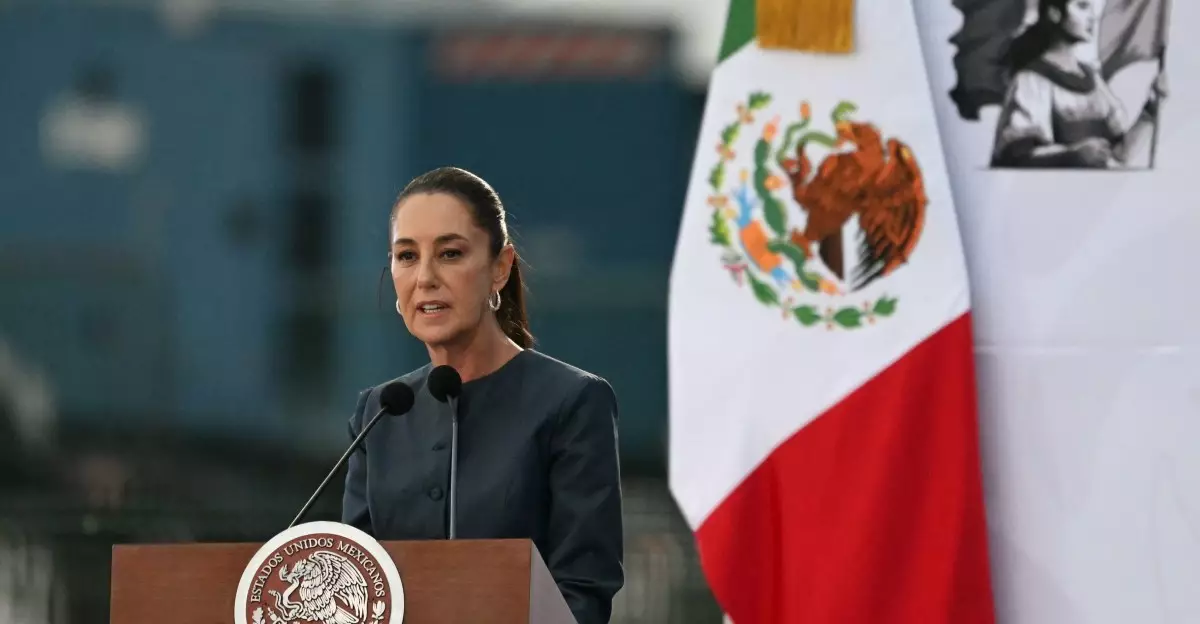The recent decision by Google to label the Gulf of Mexico as “Gulf of America” for U.S. users has sparked a diplomatic firestorm, igniting discussions on sovereignty, identity, and geographical recognition. This policy originated from a directive by former President Donald Trump early in his administration, capriciously attempting to redefine a landmark that holds historical and cultural significance beyond mere political borders. However, the ramifications of this name change extend well beyond the digital mapping platforms; they infiltrate the very fabric of national pride and cultural heritage in Mexico.
Mexican President Claudia Sheinbaum’s response illustrates this point poignantly. By announcing a lawsuit against Google for renaming this essential geographical feature, she is not just defending a name; she is staunchly standing up for the integrity of her nation and its recognition on the global stage. The audacity of one nation to dictate the naming conventions of shared geographical entities demands scrutiny and raises questions about the implications of nationalistic rhetoric in international relations.
National Sovereignty and Its Nuances
Sheinbaum’s assertions that the Gulf, part of a broader international waterway, cannot be monopolized by U.S. nomenclature reflects a larger trend of reclaiming cultural and national identity in a world that often imposes homogenization. Her emphasis on international attribution is critical, reminding us that geographical names are seldom just geographical; they symbolize national pride, historical significance, and the stories of countless generations. Unlike a mere semantic alteration, this issue delves into the underlying complexities of sovereignty and cultural heritage.
The dialogue initiated by Sheinbaum gives way for a necessary exploration into how names shape our perceptions of geography and our identities as nations and peoples. The crux of the matter lies in the authority to define: Who holds the power to name our world? Is it the country that governs, or is it shared responsibility and acknowledgment across borders that should reign supreme? Such questions bring forth profound debates about colonial legacies and the subtle ways in which power dynamics manifest in everyday nomenclature.
A Tech Giant’s Dilemma
Google, a quintessential emblem of American capitalism and innovation, now finds itself mired in the political crossfire of international diplomacy. The company’s decision to adhere to Trump’s demands put them in a precarious position, as it seems to equate technological progress with a tacit endorsement of territorial claims that might be seen as imperialistic. It raises an ethical dilemma as to whether tech giants should act as vehicles for national rhetoric, particularly when it intersects with delicate cultural issues.
Interestingly, Google’s lack of responsiveness to earlier communication from the Mexican government speaks volumes about corporate negligence toward international relationships, particularly with neighboring countries. While Google has been defended by some as merely following U.S. government wishes, the underlying question remains—should businesses involved in global commerce assume a more conscientious role in representing the nations they engage with? Herein lies the challenge of how corporations navigate political landscapes, and whether they can do so without endorsing the underlying motivations of state interests.
A Remarkable Response from Mexico
What is particularly noteworthy about the Mexican government’s reaction is its calm yet resolute stance. Instead of fuming or retaliating through hostile rhetoric, Sheinbaum’s team took a calculated approach by reaching out legally to seek compliance. This diplomatic maneuvering reinforces the significance of diplomacy in resolving international disputes and emphasizes Mexico’s commitment to maintaining its sovereignty in a politically charged landscape.
Moreover, Sheinbaum’s insistence on maintaining geographical nomenclature as it pertains to Mexican waters conveys an essential message—this is about more than a name; it is about self-determination and respect in the international community. By filing this lawsuit, the Mexican government is telling Google and, by extension, the world, that it will not allow its identity to be encroached upon or diluted by external influences.
In a time when identity is increasingly under siege—whether through poignant political maneuvering or cultural appropriation—the Gulf of Mexico versus Gulf of America debate becomes emblematic of a greater struggle. This controversy underscores the critical need for countries to assert their narratives and for tech companies to tread delicately, acknowledging and respecting the complex interplay of history and culture that shapes our world.

